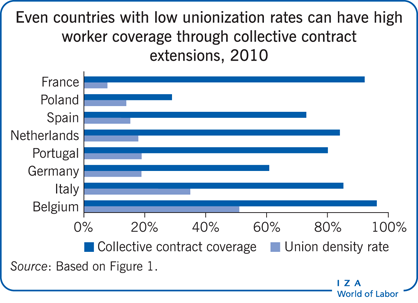Elevator pitch
In many countries, the minimum wages and working conditions set in collective bargaining contracts negotiated by a limited set of employers and unions are subsequently extended to all the employees in an industry. Those extensions ensure common working conditions within the industry, limit wage inequality, and reduce gender wage gaps. However, several studies suggest that those benefits come at the cost of reduced employment levels, especially during recessions. The income losses of workers who are displaced because of a collective contract extension can offset the wage gains among workers who keep their jobs.

Key findings
Pros
Extensions of collective contracts reduce wage inequality by setting occupation-specific minimum wages within an industry.
Extensions reduce gender wage gaps, mainly at the bottom of the wage distribution.
Extensions provide job stayers with insurance against transitory productivity fluctuations or economy-wide fluctuations associated with the business cycle.
In the absence of full mobility across jobs, extensions avoid opportunistic cuts in job quality and wages.
Cons
Sector-wide minimum wages increase labor costs to all covered firms, inhibiting employment growth.
Extensions impose working conditions on employers and employees who did not participate in the bargaining process; not all countries require bargaining parties to be representative of the entire industry.
Extensions reduce competition by deterring entry and small business creation.
Extensions introduce wage rigidities that limit the ability of firms to adapt to economic shocks.